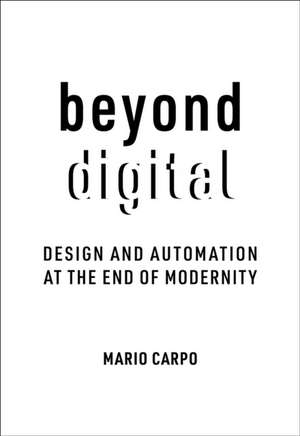Beyond Digital
Autor Mario Carpoen Limba Engleză Paperback – 18 apr 2023
Preț: 138.82 lei
Preț vechi: 172.57 lei
-20% Nou
Puncte Express: 208
Preț estimativ în valută:
26.56€ • 27.68$ • 21.99£
26.56€ • 27.68$ • 21.99£
Carte disponibilă
Livrare economică 13-20 martie
Livrare express 26 februarie-04 martie pentru 58.24 lei
Preluare comenzi: 021 569.72.76
Specificații
ISBN-13: 9780262545150
ISBN-10: 0262545152
Pagini: 199
Ilustrații: 30 black and white illustrations
Dimensiuni: 142 x 203 x 20 mm
Greutate: 0.33 kg
Editura: The MIT Press
ISBN-10: 0262545152
Pagini: 199
Ilustrații: 30 black and white illustrations
Dimensiuni: 142 x 203 x 20 mm
Greutate: 0.33 kg
Editura: The MIT Press
Notă biografică
Mario Carpo is the Reyner Banham Professor of Architectural History at the Bartlett-UCL in London and Professor of Architectural Theory at the University of Applied Arts (die Angewandte) in Vienna. He is the author of Architecture in the Age of Printing (2001), The Second Digital Turn (2017), and other books.
Cuprins
1 Ways of Making 1
1.1 Hand-Making 4
1.2 Mechanical Machine-Making 6
1.3 Digital Making 12
1.4 Beyond the Anthropocene: A New Economy without Scale 16
1.5 The Collapse of the Modern Way of Making 20
1.6 The Teachings of the Pandemic 24
2 The Future of Automation: Designers Redesign Robotics 35
2.1 Florence, 1450: The Invention of Notational Work 39
2.2 America, 1909-1913: Notational Work Goes Mainstream 42
2.3 Taylor's Reinforced Concrete as a Social Project 47
2.4 The Automation of Notational Work 52
2.5 First Steps toward Post-Notational Automation 63
3 A Tale of Two Sciences, or The Rise of the Anti-Modern Science of Computation 79
3.1 The Two Sciences 82
3.2 Modern Architecture and Postmodern Complexity 93
3.3 Architects, Computers, and Computer Science 94
3.4 Degenerate Complexism and the Second Coming of AI 112
3.5 The Limits of AI 2.0 118
3.6 Machine Learning and the Automation of Imitation 120
3.7 Sorry: There Won't Be a Third Digital Turn Driven by AI 126
4 The Post-Human Chunkiness of Computational Automation 129
4.1 Mechanical Assembly as the Style of Dissent 132
4.2 Modernist Modularity, Postmodernist Collage, and Deconstructivist Aggregation 140
Epilogue: Being Post-Digital 155
Acknowledgments 163
Notes 165
Index 191
1.1 Hand-Making 4
1.2 Mechanical Machine-Making 6
1.3 Digital Making 12
1.4 Beyond the Anthropocene: A New Economy without Scale 16
1.5 The Collapse of the Modern Way of Making 20
1.6 The Teachings of the Pandemic 24
2 The Future of Automation: Designers Redesign Robotics 35
2.1 Florence, 1450: The Invention of Notational Work 39
2.2 America, 1909-1913: Notational Work Goes Mainstream 42
2.3 Taylor's Reinforced Concrete as a Social Project 47
2.4 The Automation of Notational Work 52
2.5 First Steps toward Post-Notational Automation 63
3 A Tale of Two Sciences, or The Rise of the Anti-Modern Science of Computation 79
3.1 The Two Sciences 82
3.2 Modern Architecture and Postmodern Complexity 93
3.3 Architects, Computers, and Computer Science 94
3.4 Degenerate Complexism and the Second Coming of AI 112
3.5 The Limits of AI 2.0 118
3.6 Machine Learning and the Automation of Imitation 120
3.7 Sorry: There Won't Be a Third Digital Turn Driven by AI 126
4 The Post-Human Chunkiness of Computational Automation 129
4.1 Mechanical Assembly as the Style of Dissent 132
4.2 Modernist Modularity, Postmodernist Collage, and Deconstructivist Aggregation 140
Epilogue: Being Post-Digital 155
Acknowledgments 163
Notes 165
Index 191
